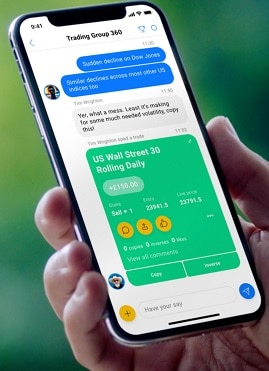Nowadays trading seems to all be about not being part of the 20%. Enter Pelican, a new multi-asset, cross brokerage trading app that aims to fill the gap between execution-only and copy trading.
As with all the other fintech companies disrupting the way people invest (cough cough Dabbl, FreeTrade, City Falcon) Pelican is currently raising funds on Seedrs, to help expand their brokerage partnerships.
What’s funny about finance is that even though it’s a massive industry. You’re never that far away from someone that knows someone. I’ve met Mike the CEO a couple of times, first round a friends house for dinner and then a few days later at the Finance magnates conference.
On the surface, Pelican may seem like all the other copy trading apps out there, but when you delve a little deeper, you’ll see what they are trying to do is different. But more importantly, why they are doing it is different.
So, for your interest, we asked Mike to tell us a little more about Pelican, who it’s for, what it does and why (if you’re a trader) you should use it…
First off, what is Pelican Exchange and why did you set it up?
Pelican is simply a tool that connects traders and their trades. This is surprisingly a unique proposition. Pelican fills the gap between trading in isolation and auto-copying (albeit we offer auto-copying too).
is simply a tool that connects traders and their trades. This is surprisingly a unique proposition. Pelican fills the gap between trading in isolation and auto-copying (albeit we offer auto-copying too).
Imagine an App where you can plug in your existing broker account execute and share live trades with friends, create groups and debate ideas, find experts and gurus to learn from (and interact with) and receive the best live trades for you to copy – that’s Pelican.
75% of traders lose money. We believe the root cause of this behaviour is because traders have only ever been allowed to trade via single purpose point-and-click terminals. Pelican follows the premise that by trading together you will make better informed and ultimately profitable decisions (which is why Bloomberg exists for bankers).
Pelican was originally conceived as ‘the WhatsApp of trading’ with the aim of bringing groups of traders closer to one another blended with an inbuilt best-in-class execution platform. The concept has now evolved into something bigger; it’s become a platform upon which traders gain insight into the wisdom of the crowd via cross-pollination of ideas.
It’s about being able to access the best ideas, trades and experts direct to your own trading account on your broker of choice.
How does Pelican differ from existing social trading brokers like etoro and ayondo or multi-broker copytrading networks like ZuluTrade?
At Pelican we recognised that consistent profitable trading is hard to achieve. The likes of eToro and Zulu suggested the way to fix this issue was to auto-copy (let another account trade on your behalf) – a bit like fund management whereby all investment decisions are outsourced to someone else. We observed two fundamental flaws with this solution.
Firstly most traders like to make their own decisions – that’s why they were attracted to the idea of trading.
Secondly, you need to find consistently profitable master accounts – a resource of traders that generally choose to trade via the premium execution platforms such as IG, City Index or MT4.
Pelican is, therefore, a tool that works with the premium execution platforms such as IG and City Index but is uniquely regulated to provide a solution that allows these accounts to interact with other traders. Our interactive features cover the entire spectrum of ‘social trading’ one can:
- Find a good trade to copy;
- Create a private group with friends to trade with;
- Search for an expert in a market that you’re interested in
- Tag a question to a live trade of interest;
- Join a group managed by a mentor or guru; and
- Analyse one’s own trade activity
Pelican provides the full suite of social tools for the trader that wants to be part of the their own decision making process. For Pelican to be able to do this we need to provide tools that work at the granular TRADE level (our users can interact with each others trades) whereas eToro and Zulu work on the aggregate PORTFOLIO level whereby they are offered leaderboards based on an aggregated performance.
Simply, if you are a beginner that wants to learn to trade or an existing trader that wants to get better- Pelican is for you. If you want someone to trade for you- Zulu and eToro are the right places for you.
Finally – and crucially – we’re a London based company directly regulated by the FCA. To the best of our knowledge we’re the only firm to have been approved by the FCA for both retail and professional traders to interact.
This is fundamental to the design of the App – we worked closely with the FCA to ensure the necessary safeguards were in place to protect traders against misinformation and ensuring ultimate account control.
What would you say are the first three things new Pelican users should do when they sign up to the app?
First port of call I’d suggest would be the Discover section; this is a snapshot of the top performing groups, traders and trades in real-time. This should give people a few suggestions as to where to begin the expansion of their network.
From here following some of the better traders will mean you begin to receive notifications when they place new trades or orders and monitor the signals for a while before you consider incorporating their output as part of your strategy or reach out to them directly and scrutinise the reasoning behind their trade.
Secondly, we’d suggest joining a few groups that are relevant to you. The content of the groups varies from market commentary to pure signal provision but the consistent theme with any public group is that traders are encouraged to engage and aid one another. An alternative to this is to create your own group, open your ideas up to scrutiny, allow others to benefit from your success and measure yourself against the community.
Lastly, if it’s just trading with people you know that you’re after – create a group make it private and invite your friends to trade with you in your own private network.
Finally, if the concept of Pelican appeals, you’re able to enjoy all our features without leaving your current broker. By linking your existing broker account to Pelican you’re able to continue to trade as before whilst contributing to Pelican. The relationship Pelican has with its users is symbiotic and trading volume is the lifeblood of any social system.
You are mobile only at the moment. Any plans to launch a desktop version for full-time traders who like to deal off multiple screens?
One of our more recent developments is to move towards a multi-broker offering so that we are able to exist alongside traders’ current set-ups.
We do not necessarily wish to compete with the providers of technical analysis and other resources that traders like to use on their desktop.
In the future we would like to have a desktop version of Pelican but with oodles of exciting new App features in development alongside integration with increasing numbers of brokers, desktop capability will have to wait, for now.
Do you think that copy trading can become a long term investment asset class like bonds or funds to be included in SIPPS and stocks and shares ISA wrappers?
The regulation under which copy trading resides – would deem theoretically that it already qualifies for your ISA. Pelican has had to become an RDR compliant Investment Manager.
Furthermore spread betting is already tax-free. As a sub-sector of an already niche market it is highly unlikely to gather further support as its own investment class. Post-ESMA (a recent rule intervention from the European financial governing body) the landscape for margin trading has changed dramatically.
It appears that the governing bodies are determined to push margin trading as the preserve of professional traders.
And finally, what are your top three online resources for investors who want to improve their trading, obviously excluding Pelican?
I think any tool that gives traders unique information or even presents info in a way that will get traders to think about their trading is beneficial, that’s why I have no problem in recommending other ‘competitors’ of sorts. I use a handful of different Apps and they all provide value.
City Falcon are good for news; rather than being overwhelmed quantity of content they seem to do a good job of filtering out the articles that aren’t of relevance to me.
Secondly, I have used wiley.com in the past- it’s an online library of literature on all aspects of trading for technical analysis to psychology. I don’t use it often but each time I have it has been useful to me.
Finally, perhaps a curveball, but I value Twitter as useful for trading. Until the time that the global trading community use Pelican as their trade sharing platform of choice there will still be insightful analysis on Twitter, if you know the right places to look.

Richard is the founder of the Good Money Guide (formerly Good Broker Guide), one of the original investment comparison sites established in 2015. With a career spanning two decades as a broker, he brings extensive expertise and knowledge to the financial landscape.
Having worked as a broker at Investors Intelligence and a multi-asset derivatives broker at MF Global (Man Financial), Richard has acquired substantial experience in the industry. His career began as a private client stockbroker at Walker Crips and Phillip Securities (now King and Shaxson), following internships on the NYMEX oil trading floor in New York and London IPE in 2001 and 2000.
Richard’s contributions and expertise have been recognized by respected publications such as BusinessInsider, Yahoo Finance, BusinessNews.org.uk, Master Investor, Wealth Briefing, iNews, and The FT, among many others.
Under Richard’s leadership, the Good Money Guide has evolved into a valuable destination for comprehensive information and expert guidance, specialising in trading, investment, and currency exchange. His commitment to delivering high-quality insights has solidified the Good Money Guide’s standing as a well-respected resource for both customers and industry colleagues.
